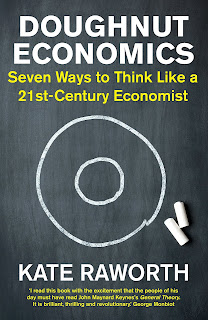Book Review:- Doughnut Economics: Seven ways to think like a 21st century economist by Kate Raworth
In this blog I note down the major takeaways from the book:
- The word economics coined by Greek philosopher Xenophon. Oikos = household, nomos = rules or norms
- Narrow and mostly quantitative/ theoretical scope of economics education curriculum led to student protests in 2008
- There is a lot of authority if economics because it is the language of public policy and has separate noble prize for economic sciences
- Rethinking economics by starting economics not with the long-established theories but with humanity's long-term goals.
- The doughnut which is a safe and just space for well-being of all while avoiding ecological destruction and human deprivation poverty. The doughnut which is a pictorial representation of the concept to guide humanity in 21st century in line with the SDGs.
- The author calls for unlearning and relearning the fundamentals of economics and the power of pictures in explaining economics.
- Raworth finds it ironic that 20th century economists decide to define economics as a science of human behavior but based in the assumption of a rational economic man.
- Seven ways to think like twenty-first century economists: 1. Change the goal from GDP to doughnut, 2. See the big picture: self contained market to embedded economy, 3. Nurture human nature: rational economic man to socially adaptable humans, 4. Get savvy with systems: mechanical equilibrium to dynamic complexity, 5. Design to distribute 6. Create to regenerate 7. Be agnostic about growth
- Human welfare centric growth called humanistic economics.
- Five factors to consider which will significantly shape humanity: population, distribution, aspiration, technology and governance
- Areas neglected by the 20th century neoliberalism: market, commons, society, earth, economy, household, finance, trade and power.
- Majority of researches on human societies done in WEIRD societies: W = Western, E = Educated, I = Industrialized, R = Rich and D = Democratic.
- "Today's economy is divisive and degenerative by default. Tomorrow's economy must be distributive and regenerative by design".
- Redistributing wealth: Land ownership, money creation, enterprise, technology and knowledge.
- GDP growth is not infinite so we need an economy that makes us thrive whether or not it grows.




Comments
Post a Comment